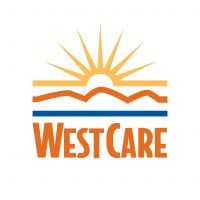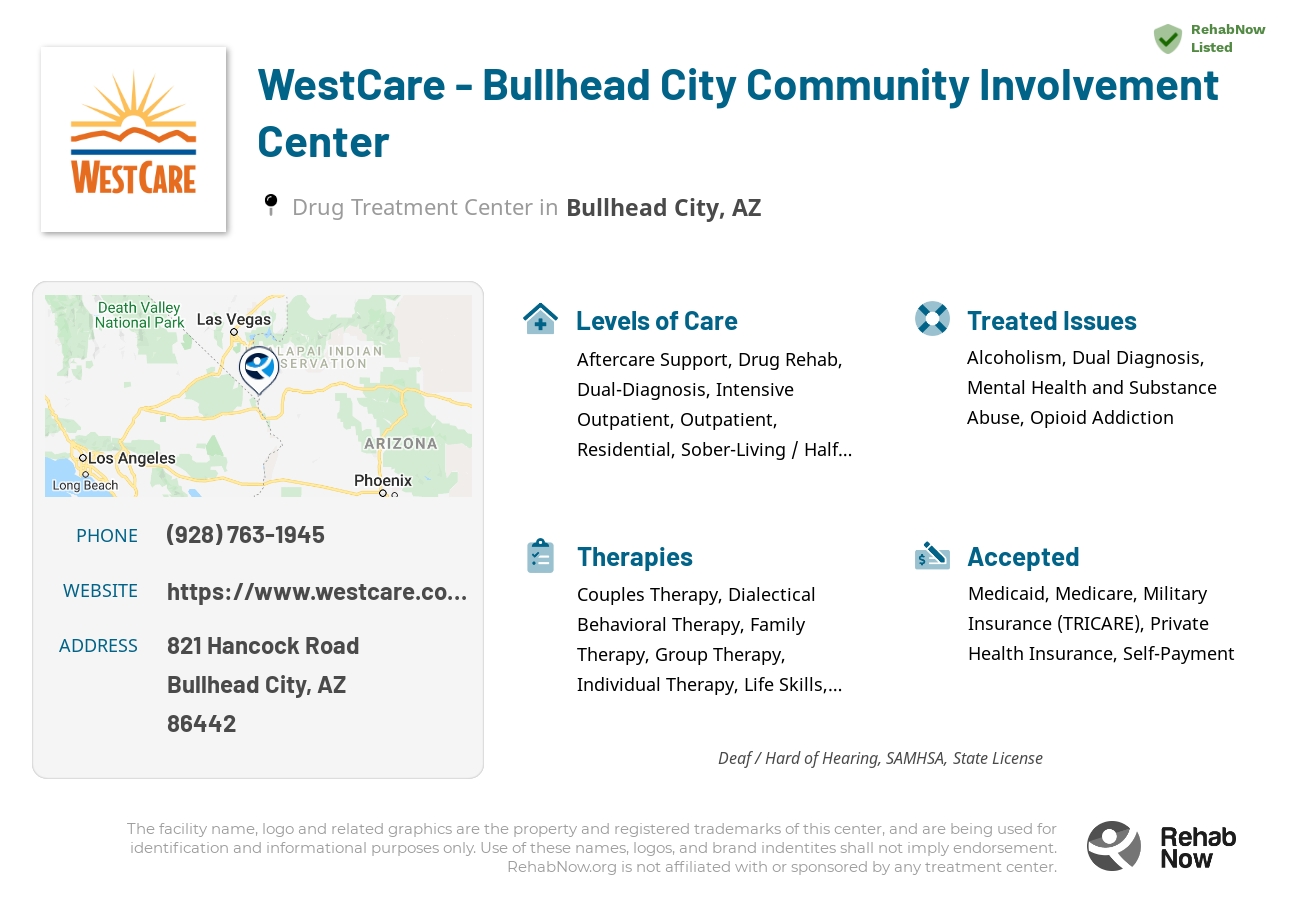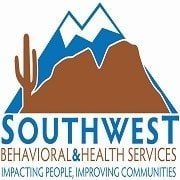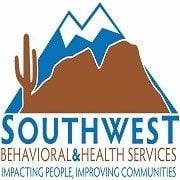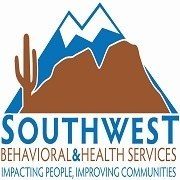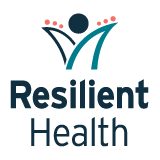WestCare - Bullhead City Community Involvement Center
Drug Rehab Center in Bullhead City, Arizona
WestCare Bullhead City Community Involvement Center offers a reliable, SAMHSA-accredited, state licensed drug rehab program with various levels of care to assist individuals in recovery from Alcoholism, Opioid Addiction, Drug Addiction and Dual Diagnosis, and also accepts private health insurance as payment for services.
About WestCare - Bullhead City Community Involvement Center in Arizona
WestCare - Bullhead City Community Involvement Center, situated in Bullhead City, Arizona, is a beacon of hope for those grappling with drug and alcohol dependence. This outpatient clinic is not just a place for treatment; it's a community committed to uplifting the human spirit. With a unique approach to recovery, WestCare offers a range of services including legal assistance and aftercare, making it a standout facility in the region.
- Comprehensive Support Services: From transportation and legal assistance to DUI screenings and domestic violence treatment, WestCare provides a holistic approach to recovery.
- Dedicated to Women and Children: The opening of Hildy's House highlights WestCare's commitment to specialized programs for women and women with children.
- Continuum of Care: Offering everything from home-based outreach to aftercare services, WestCare ensures support at every step of the recovery journey.
Accredited by JCAHO, SAMHSA, and holding a State License, WestCare - Bullhead City Community Involvement Center sets a high standard for addiction treatment. Their focus on improving, expanding, and strengthening their services underlines their commitment to helping individuals grow, change, and heal.
Specializing in treating alcoholism, dual diagnosis, opioid addiction, and more, WestCare employs a variety of treatment methods. From detox and inpatient care to outpatient and intensive outpatient programs, they tailor their approach to fit each individual's needs, ensuring a path towards lasting recovery.
Genders
Ages
Modality
Additional
Accreditations
State License
SAMHSA

JCAHO
Conditions and Issues Treated
Opioid addiction starts when a person becomes addicted to legal or illegal opioids. The addiction can happen quickly, in just a matter of days. Opioid withdrawal can be extremely uncomfortable and lead the user to continue to use even if they want to quit. Stopping using an opioid requires medical observation. Sometimes inpatient treatment with a medically supervised detox is necessary for managing the withdrawal process while learning lasting tools for maintaining recovery. Medications may be used in some cases of opioid addiction.
Opioid addiction is one of Arizona‘s most prominent forms of addiction. It’s treated by detoxifying the body so that the chemicals from the medications no longer impact them and by therapies to correct behavior and target the root of the problem.
Recovery is not simply about stopping drug use. Recovery is working with addiction while recovering mental health issues that are fueling the addiction in the first place.
Levels of Care Offered
This center offers a variety of custom treatment tailored to individual recovery. Currently available are Aftercare Support, Drug Rehab, Dual-Diagnosis, Intensive Outpatient, Outpatient, Residential, Sober-Living / Half-Way, with additional therapies available as listed below.
Addicts who need help with their addiction can enroll in an intensive outpatient program (IOP). But the patient won’t live there during treatment.
IOP involves patients visiting a medical office building regularly for therapy and other services while continuing to live their lives.
IOP is a step up from drug or alcohol detox, but it’s still a phase of recovery, not the end goal. Patients in need of IOP have many options for rehab and treatment.
Outpatient treatment is considered the lower intensity level of addiction treatment. It’s ideal for early phase addiction or lower intensity addictions. It may include weekly sessions instead of daily. It may include weekly sessions instead of daily. Peer group support, 12-step programs, and individual counseling may still be involved but at a lesser frequency than an intensive outpatient program. It is a good choice for someone who doesn’t need to go through a medically supervised detox and who has a supportive home environment. It requires motivation and dedication to commit to the program without constant monitoring.
Sober living homes (abbreviated SLHs or sometimes sober houses) are temporary housing for recovering addicts. The typical SLH functions as a halfway house, providing a stable living environment for addicts in recovery. While at an SLH, residents typically meet with various therapists on site and attend regular 12-step meetings as well as other recovery group meetings.
Residential treatment programs are those that offer housing and meals in addition to substance abuse treatment. Rehab facilities that offer residential treatment allow patients to focus solely on recovery, in an environment totally separate from their lives. Some rehab centers specialize in short-term residential treatment (a few days to a week or two), while others solely provide treatment on a long-term basis (several weeks to months). Some offer both, and tailor treatment to the patient’s individual requirements.
Aftercare support should take place after outpatient treatment has ended. There are a few different types of aftercare support that patients can seek. These include 12 Step, Self-help groups (AA, NA), Therapeutic communities, Long-term, structured sober living arrangements, and Halfway houses (residential treatment centers).
Therapies & Programs
Individual therapy involves one-on-one sessions between the patient and therapist. It provides patients with a safe environment to openly discuss personal and sensitive issues with the therapist. They find the therapist as someone they can trust. Individual therapy aims to identify the core issues that would have led the patient to substance abuse and address them effectively. The therapist can develop patient-specific customized solutions through individual therapy, which aids speedier recovery.
Couples therapy works with clients and significant others in a professional capacity to improve relationship dynamics. This can be helpful for addicts who are trying to marry the idea of recovery into their work, family, social lives – any aspect that has to do with relationships.
Through counseling sessions, addicts will have an opportunity to talk about their addiction with professional partners. These partners can offer feedback and advice on how to get sober while keeping healthy relationships intact. A good couples therapist will help addicts understand their part in an unhealthy relationship dynamic or find ways to deal with anger or resentment from significant others outside of the home.
Family therapy is a group problem-solving that aims to improve communication and relationships between the addict, their family, and sometimes friends. The main goal of family therapy for drug addiction is to create an environment where communication can occur without judgment, hostility, or blame. The therapist is with the family as they learn to communicate differently, especially with the addict when s/he is using. The family can learn to reduce their enabling behavior or rally together and support each other during tough times.
An addict’s family can play a vital part in helping them to avoid relapse because they can spot the warning signs and help them get back on track before it becomes too much of a problem. Family therapy is one of the most effective ways to help addicts stay on the path to long-term sobriety. When a drug addict decides that they want to try and get sober, it takes the support of every person they love to succeed. It can be incredibly difficult for loved ones to watch an addict go through the pain and suffering of withdrawal, but by being there with them and supporting them, they can help to make sure that the addiction never returns.
Groups typically involve meetings with other recovering addicts who can relate to one another’s experiences. They might meet in person or online and typically focus on the process of staying sober rather than overcoming a specific addiction.
In these groups managed by WestCare - Bullhead City Community Involvement Center, addicts can build a sense of community and develop strong emotional connections with others who understand what they are going through. These beneficial relationships can help addicts overcome their cravings and prevent relapse at any point during the recovery process.
In general, trauma therapy is a clinical process that helps individuals deal with mental stress often caused by traumatic events. The therapist helps the person identify, understand, and work through the problem. This is done with the help of talking about it in group or one-on-one counseling sessions. Therapists use relaxation, role-playing, art, and music to help the person open up about what is bothering them.
There are many different types of trauma therapists, such as psychiatric nurses and counselors. Not everyone is a good candidate for this type of therapy; it is generally reserved for people who have recently experienced a traumatic event and struggle to get over it. It is often done for children, teenage victims of sexual assault, and war veterans.
Dialectical Behavior Therapy (DBT) is a type of therapy created in the late 1980s and early 1990s to help people with high rates of suicidal behavior. DBT helps people learn how to live a life that is no longer controlled by overwhelming emotions and urges. It is beneficial in treating drug addiction because it helps patients understand and cope with their cravings for drugs or alcohol rather than turning to those substances as a way of coping.
There is hope for people who are addicted to drugs and alcohol. Cognitive Behavioral Therapy (CBT) is the solution. CBT focuses on the underlying thoughts and behaviors that caused the addiction problem in the first place and may cause a relapse. This type of psychotherapy addresses negative feelings common in substance abuse disorders. It helps to change them by restructuring thought patterns. It’s about removing negative thoughts and providing long-term benefits while promoting self-awareness, self-control, and healthy ways to respond to negative thoughts. These sessions can be done by themselves or as part of combination therapy.
REBT, or Rational Emotional Behavior Therapy, is a way of replacing negative thoughts with positive ones. It teaches people how to deal effectively with their unwanted habits and emotions. Some common problems people have are procrastination, unhealthy eating, and angry outbursts. Learning how to deal with these problems in a productive manner makes them less apt to come back.
Since addiction is a chronic physical and mental illness, addicts need to learn as many life skills as possible. Many drug treatment centers offer life skills activities as part of their addiction recovery programs. Examples include cooking classes, employment training, resume writing seminars, parenting classes, and computer training. Life skills activities help addicts find employment, take care of their families, and give back to the community.
Payment Options Accepted
For specific insurance or payment methods please contact us.
Is your insurance accepted?
Ask an expert, call (888) 674-0062
WestCare Arizona Associated Centers
Discover treatment facilities under the same provider.
- WestCare - Blossom House in Bullhead City, AZ
- WestCare - Diamond House in Bullhead City, AZ
- WestCare - Kingman Community Involvement Center in Kingman, AZ
- WestCare - Discovery House in Bullhead City, AZ
- WestCare - Lake Havasu City Community Involvement Center in Lake Havasu City, AZ
Learn More About WestCare Arizona Centers
Additional Details
Specifics, location, and helpful extra information.
Bullhead City, Arizona 86442 Phone Number(928) 763-1945 Meta DetailsUpdated April 15, 2024
Staff Verified
WestCare - Bullhead City Community Involvement Center Patient Reviews
There are no reviews yet. Be the first one to write one.
Bullhead City, Arizona Addiction Information
Arizona has some of the highest rates of prescription drug abuse in the United States. Methamphetamines, heroin and morphine are among the most commonly abused substances. Prescription pain relievers were prescribed to 348 million people in 2012, enough to medicate every adult in Arizona for 2 full weeks. The number of people with substance use disorders in Arizona has remained relatively constant over the past few years.
The drug abuse problem in Bullhead City is extremely severe, due in part to the high number of residents with medical and prescription drug problems. 14.5% of the population has a serious addiction to prescription drugs or illegal narcotics. There are a variety of drug treatment options available for someone looking to get sober in Bullhead City, Arizona. Drug rehab treatment is an important step on the road to recovery from addiction.
Treatment in Nearby Cities
- Mohave Valley, AZ (12.3 mi.)
- Mesa, AZ (197.8 mi.)
- Cave Creek, AZ (176.0 mi.)
- San Luis, AZ (181.6 mi.)
- Wickenburg, AZ (133.5 mi.)
Centers near WestCare - Bullhead City Community Involvement Center
The facility name, logo and brand are the property and registered trademarks of WestCare - Bullhead City Community Involvement Center, and are being used for identification and informational purposes only. Use of these names, logos and brands shall not imply endorsement. RehabNow.org is not affiliated with or sponsored by WestCare - Bullhead City Community Involvement Center.
